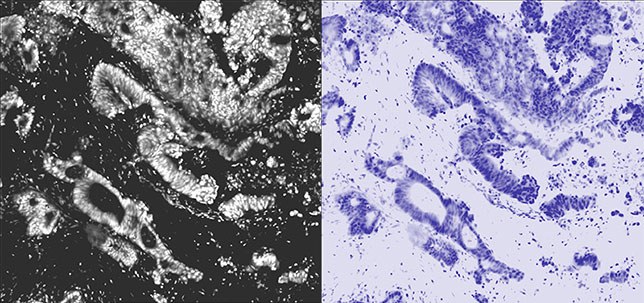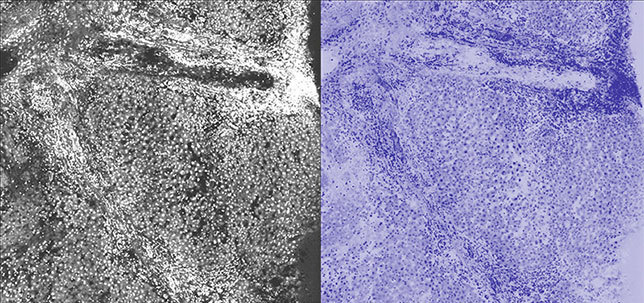- Home
- In Vivo Microscopy Topic Center
Pathologists are key players in the development, validation, and clinical implementation of new microscopic imaging technologies. At the forefront is In Vivo Microscopy, where microscopic images are obtained in vivo, in real- time, during clinical procedures.
In Vivo Microscopy in Detail
In Vivo Microscopy (IVM) is an exciting field where microscopic images are obtained in vivo, in real-time, during clinical procedures. IVM imaging technologies use light and rapidly produce 2D or 3D (tomographic) microscopic images. These images may be obtained using instrumentation compatible with existing standard of care clinical instruments (e.g., that can be inserted into endoscope accessory ports) or as standalone imaging tools. IVM is in clinical use in Gastroenterology, Ophthalmology, Cardiology, Dermatology, and in other clinical disciplines, including Pulmonary Medicine, Urology, Breast, and Neurosurgery.


Why Pathologists are Central to IVM
Pathologists are the experts in diagnosing disease through the interpretation of diagnostic microscopic images. With the evolution of IVM technology, their expertise to properly interpret new types of microscopic images establishes a role for pathologists as interventional microscopists.
Mini-fellowship Opportunities for Pathologists
Dr. Nicholas P. Reder, MD, MPH
University of Washington Medical Center
Dr. Liu's molecular biophotonics laboratory develops custom microscopes and endoscopic imaging devices, along with molecularly targeted contrast agents, for diagnosing diseases and for guiding therapy. In particular, Dr. Liu's lab has developed an open-top light-sheet microscopes to enable high-resolution 3D slide-free imaging of tissues for early cancer detection, improved diagnosis/grading of tumors, and surgical guidance. The lab also has developed spectral-imaging endoscopes and intraoperative imaging devices, in conjunction with nanoparticle contrast agents, for multiplexed molecular imaging of disease biomarkers. For more information, visit Molecular Biophotonics Laboratory.
Pathologist collaborators include Dr. Lawrence True and Dr. Nicholas Reder in genitourinary pathology and Dr. Suzanne Dintzis in breast and gynecologic pathology. This mini-fellowship is ideal for pathologists interested in EVM of prostate or breast tissues, as well as for those interested in IVM, multiplex molecular imaging, and additional organ systems.
Dr. Lida Hariri, MD, PhD
Massachusetts General Hospital, Harvard Medical School
Dr. Hariri, is an Assistant Professor of Pathology and biomedical optics researcher at Massachusetts General Hospital, Harvard Medical School. Her research lab focus on development, translation and clinical application of high-resolution in vivo optical microscopy (IVM) for: 1) early detection and diagnosis of pulmonary diseases, particularly interstitial lung disease and lung cancer, 2) real-time tumor biopsy guidance to increase diagnostic yield, and 3) integrating in vivo microscopy into the practice of clinical medicine and pathology. She is an Advisor of the College of American Pathologists (CAP) Digital and Computational Pathology Committee.
In this mini-fellowship, participants will work under the supervision of Dr. Hariri and her laboratory. This mini-fellowship is ideal for pathologists interested in IVM integration into clinical practice for biopsy guidance and/or lung disease assessment.
Dr. Guillermo J. Tearney
Massachusetts General Hospital, Harvard Medical School
Dr. Tearney’s laboratory focuses on integration of IVM into pathology of the gastrointestinal system.
This mini-fellowship would be under the supervision of Dr. Guillermo Tearney and Dr. Dan Lopez. The position is ideal for early-career pathologists interested in a general overview of IVM technologies, review and interpretation of images from clinical procedures, and review of teaching material. Participants will not only conduct in-vivo microscopy procedures but also participate in sign-out and ongoing research projects. At the completion of the mini-fellowship, the participants should have broad knowledge of gastrointestinal IVM technology and IVM image interpretation, skills required to continue research in IVM, and a commitment to growing the clinical IVM field for pathologists worldwide.
Dr. Babar Rao
Rutgers University, Robert Wood Johnson Medical School
Dr. Rao is a pioneer in dermatoscopy, a non-invasive method for skin cancer detection.
This mini-fellowship would be under the supervision of Dr. Rao. The position is ideal for pathologist residents interested in the field of dermatopathology and the application of IVM technologies to its practice. Primary focus will be on use of the Vivascope by CaliberID for image acquisition and basic reflectance confocal microscopy interpretation of skin diseases. The duration of the mini-fellowship is a minimum of 2 weeks but will vary depending on the interest level of the resident.
Benefits of In Vivo Microscopy
- Guide biopsy site acquisition in real time to obtain targeted and diagnostically significant biopsies, as in pulmonary nodules or breast cancer
- Perform comprehensive screening for occult microscopic disease, as in capsule screening for Barrett Esophagus
- Obtain microscopic diagnoses when tissues cannot be easily or safely excised, as in coronary arteries, retinal screening or pulmonary fibrosis
- Guide and assess the efficacy of therapy, such as in chemotherapy, laser ablation, guided surgical ablation, focused ultrasound, cryotherapy, radiofrequency, and brachytherapy
Ex Vivo Microscopy of IVM in Detail
Ex Vivo Microscopy (EVM) is the use of IVM technologies by pathologists in the ex vivo setting, without damage or destruction to the tissue. EVM imaging systems are small and portable, and can be used in virtually every pathology setting: the surgical suite, the procedure room, the grossing room, the laboratory, and the biobank. EVM creates digital images that can be viewed and interpreted remotely so the pathologist does not need to be physically present for EVM to be useful. Digital EVM images can be sent electronically to remote pathologists for consultation, and also used as digital documentation of biobank and other research tissues.
Benefits of Ex Vivo Microscopy
- Evaluate small tissue biopsies for adequacy, as in breast, lymph nodes, and lung cancer biopsies.
- Triage biopsy and other tissues for molecular and genomic studies, as in lung cancer
- Guide the selection of tissue for frozen and permanent sections for diagnostic material
- Guide tissue collection for Biobanking and other research purposes
IVM and EVM Resources
- IVM Webinars
- The In Vivo Microscopy Resource Guide contains a set comprehensive resources providing understanding of IVM/EVM technology and applications, plus insights from early adopters.
- IVM Short Presentations on Emerging Concepts (SPECs). SPECs are available to CAP members on the following topics:
- Educational briefs provide better understanding about emerging applications of IVM/EVM technology.
- In Vivo Microscopy for the Evaluation of Barrett Esophagus (PDF, 1.16 MB)
- In Vivo Microscopy Executive Summary (PDF, 494 KB)
- Ex Vivo Microscopy – Why EVM is an Important Tool for Pathologists (PDF, 411 KB)
- Preparing Residents for the Next Generation of Microscopy (PDF, 1.56 MB)
- In Vivo Microscopy for the Evaluation of Pancreatic Lesions (PDF, 977KB)
- IVM Committee members are offering mini-fellowships, one to four week hands on didactic and clinical learning experience (usually an extra rotation within a fellowship). Contact the CAP if you are interested.
- A new subsection of the Anatomic Pathology Checklist, which promotes best practices in both In Vivo and Ex Vivo Microscopy.
- Publications and articles on various aspects of IVM and EVM technologies
- Introduction to In Vivo Microscopy (IVM) Interpretation is a free course offered annually and designed specifically for pathologists. This course is sponsored by the CAP IVM Committee.
IVM and EVM Webinars
The IVM webinar series provides education about various applications of IVM/EVM. View the webinars section to find more details about these events and to access previous webinars.
| June 10, 2021 | Realizing Artificial Intelligence in Pathology – Streamlining Machine Learning Model Development and Clinical Deployment Speaker: Markus D. Herrmann, MD, PhD |
| June 4, 2020 | The Promising Potential of Ex Vivo Microscopy as the Next Generation Digital Microscopy Tool for Surgical Pathology Practice Speaker: Savitri Krishnamurthy, MD |
| Nov 4, 2020 | Artificial Intelligence Applications for Ex Vivo Microscopy Speaker: Nicholas P. Reder, MD, MPH |
| Feb 26, 2019 | In Vivo Microscopy for Guiding Biopsy Acquisition in Patients Speaker: Guillermo Tearney, MD, PhD |
| Apr 11, 2019 | Ex-Vivo Microscopy-A Promising Next Generation Digital Microscopy Tool for Surgical Pathology Practice Speaker: Savitri Krinshnamurthy, MD |
| Jul 30, 2019 | Ex Vivo Microscopy (EVM) Systems- Functional Requirements and CAP Checklist Compliance Speaker: Sharad Mathur, MD |
| Oct 29, 2019 | Stimulating Raman Histology- A novel technology to image fresh tissues in real-time. Speaker: Sandra Ines Camelo-Piragua MD |
| Apr 19, 2018 | Microscopy with UV-Surface Excitation Speaker: Richard M. Levenson, MD, FCAP |
| May 23, 2018 | Justifying the Introduction of Emerging Technologies into a Pathology Department – How to Develop a Business Plan Speaker: Wendy Wells, MD, MBBS, FCAP |
| July 10, 2018 | Incorporation Of In Vivo Microscopy (IVM) Into Pathology Practice Speaker: Hany Osman, MD |
| Apr 25, 2017 | Confocal Microscopy for Pigmented Lesions Speaker: Babar Rao, MD |
| May 30, 2017 | Creating a Successful Pathology-engineering Collaboration Speaker: Nicholas P. Reder, MD, MPH |
| Sep 20, 2017 | Confocal Microscopy of Non Melanocytic Lesions Speaker: Babar K. Rao, MD, FCAP |
| Oct 3, 2017 | Light-sheet Microscopy for 3D Pathology Speakers: Nicholas P. Reder, MD, MPH; Lawrence True, MD |
| Nov 7, 2017 | Rapid Examination of Fresh Tissue Using Light-sheet Microscopy Speaker: Nicholas P. Reder, MD, MPH |
| Dec 5, 2017 | Role of Reflectance Confocal Microscopy in Skin Inflammations Speaker: Babar K. Rao, MD, FCAP |
Get Involved With IVM Projects
Send us an email to get involved with IVM projects or request to be on our mailing list. If you are interested in being a part of the IVM Committee, apply now.
- Login and CAP Membership Required.
Contact Information
Please direct questions or comments to:
IVM Committee
ivminfo@cap.org
800-323-4040